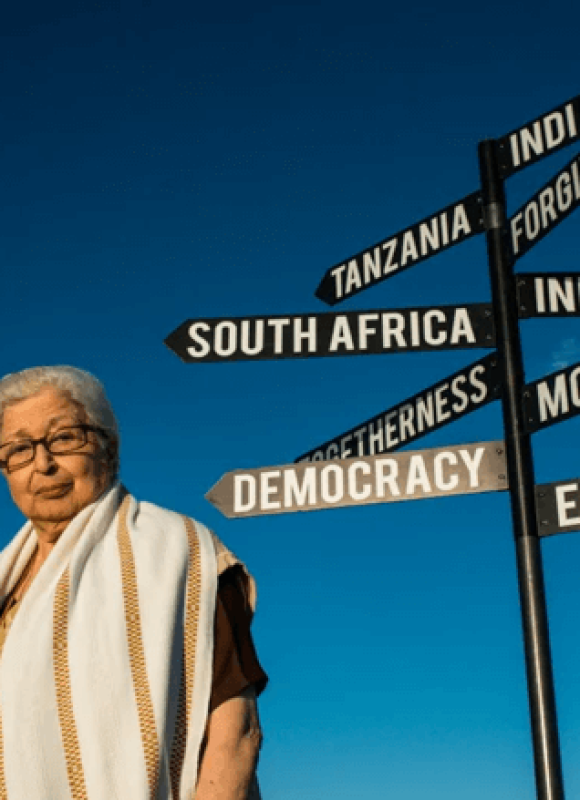PIONEER
Frene Noshir Ginwala

Journalist | Lawyer | Women’s rights activist
Born: 25 April 1932
“All too often, integrity and accountability are confused. They are two sides of the same coin, but each one is distinct. Integrity denotes a set of personal values, beliefs and morals that permeate one’s being.”
Who is
Frene Noshir Ginwala?
Member of the African National Congress (ANC), women’s rights activist, journalist and lawyer, who served as Speaker of the National Assembly.
Professions
and Roles
Journalist, editor, lecturer, lawyer, radio programme producer, ANC member, politician, Chancellor of the University of KwaZulu-Natal, Speaker of the National Assembly.
Best Known For
First woman to serve as Speaker of the National Assembly.
Life highlights
- Ginwala went into exile in 1960 and organised safe escape routes for anti-apartheid activists including Oliver Tambo and Yusuf Dadoo. While in exile, she established an exile ANC office in Dar es Salaam, Tanzania.
- Ginwala was appointed managing editor of The Standard and The Sunday News in Tanzania, and founded the monthly journal Spearhead.
- Ginwala was appointed as head of the Political Research Unit in the Office of ANC President Oliver Tambo, where she conducted research focusing on the transfer of military and nuclear technology. She also served as ANC spokesperson in the UK on sanctions, the nuclear programme, and the arms and oil embargo relating to South Africa.
- Ginwala was appointed Speaker of the National Assembly from 1994 until 2004, and was then appointed as the first chancellor of the University of KwaZulu-Natal in 2005.
- Ginwala was awarded the Order of Luthuli in Silver in 2005 for her “excellent contribution to the struggle against gender oppression and her tireless contribution to the struggle for a non-sexist, non-racial, just and democratic society.”
IN THEIR OWN WORDS
“O R Tambo was clear that a truly democratic South Africa would require a constitutional framework which would determine the nature, structure and character of the state. He was also clear that it would be informed and inspired by the Freedom Charter of the ANC and would have a human rights ethos which would form the moral basis of the state. To this end, he set up a Constitutional Committee made up principally of legal experts to examine various models of democracy and shape a constitutional framework for a new democratic dispensation when the time arrived.
I was privileged to be the first Speaker of the National Assembly, and with my counterpart Kobie Coetzee, I was tasked to develop the Rules of the House and legislation dealing with powers and privileges of Members of Parliament. At the same time, we were to determine the best legislative processes in the areas of shared competences with Provinces … we sought to shape Parliament, so that its members could be activists for change and to ensure that we provided an inclusive, open and participatory institution that would celebrate the open and democratic society we had committed ourselves to.”
-Frene Ginwala
“All too often, integrity and accountability are confused. They are two sides of the same coin, but each one is distinct. Integrity denotes a set of personal values, beliefs and morals that permeate one’s being. In an organisation we speak of an organisational or institutional culture. This constitutes a higher code of personal or inherent probity that goes beyond legal prescripts. This is what we need to inculcate in the South African population, through education, by example and by leadership. Accountability is rules based, and flows from the responsibility that one is charged with or a responsibility that one assumes. It requires reporting, explanations of actions, disclosure and the assumption of responsibility.”
-Frene Ginwala, Council for the Advancement of the South African Constitution on 21 January 2011
IN THE WORDS OF OTHERS
“I cannot conclude without referring to the way women at the World Trade Centre stood together to ensure that women’s rights and gender equality in the equality clause were not qualified or watered down in any way. Former Speaker Frene Ginwala led the way here. I believe that if women negotiators had not done so, they would not have been taken as seriously as they eventually were – by either of the main protagonists in the negotiations – the ANC and the NP.”
– Sheila Camerer, South African politician
“We cannot forget the invaluable contribution of members such as Frene Ginwala, especially regarding the right to security of a person’s body and every person’s right to make decisions about their body.”
– Enver Surty, former Deputy Minister of Basic Education
Parliament of the Republic of South Africa (2018) Theme Committee Book Series 1-6
